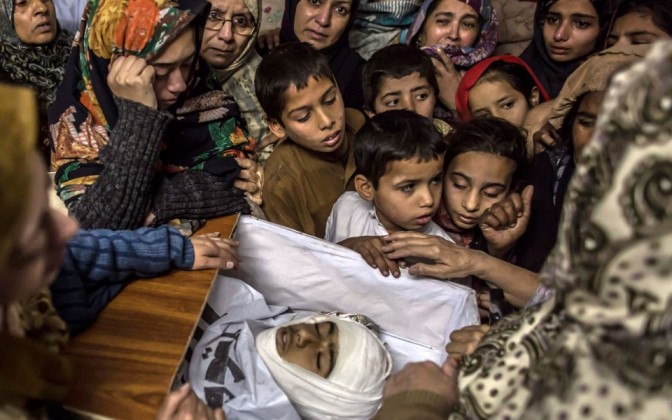
Déjà vu
In the first corps commanders’ conference chaired by Pakistan Army Chief Gen Asif Munir which concluded recently, it was “resolved to fight against terrorists without any distinction and eliminate this menace as per the aspirations of the people of Pakistan”. The army’s decision to take the bull of terrorism by its horns was long overdue and hence should have served as a soothing balm for the country’s terrorism public.
However, the public isn’t enthused and the reason isn’t hard to find. The assurance that Rawalpindi would “fight against terrorists without any distinction”, reminded the people of a similar promise which was made by the army eight years ago but was never fulfilled.
A poor track record
On 15 June 2014, the Pakistan Army launched ‘Operation Zarb-e-Azb’, anddescribed it as “a comprehensive operation against foreign and local terrorists who are hiding in sanctuaries in North Waziristan Agency”. This announcement was very well received by the people who thought that the Pakistan Army would walk it’s talk, and by acting against all terrorist groups across the board, finally end this menace.
A few days after Operation Zarb-e-Azb commenced, Director General [DG] of the Pakistan Army’s media wing Inter Services Public Relations [ISPR] told the media that “We are going after terrorists of all hue and colour”. Since ISPR had already made it amply clear that Zarb-e-Azb was “a comprehensive operation against foreign and local terrorists”[Emphasis added]. To the uninitiated, the DGISPR’s reiteration of the army acting against “terrorists of all hue and colour” may have appeared superfluous and hence, unnecessary.
Pakistan watchers, on the other hand, are well aware that since the Pakistan Army’s sincerity in its ‘war against terror’ has always been suspect, Rawalpindi perforce has to go overboard for concealing its duplicity on this issue. Furthermore, since the situation on ground belied ISPR’s claim that terrorists in North Waziristan had been surrounded and hence would have to either surrender, or face extinction, ISPR went into an overdrive to salvage Pakistan army’s professional reputation.
Soon after ‘Zarb-e-Azb’ commenced, it had become amply clear that certain dreaded terrorist groups having a large presence in North Waziristan were able to safely move out of this area-lock, stock and barrel, despite the Pakistan army’s claim of having blocked all escape routes. Since ‘the ones who got away’ were terrorist groups having links with Rawalpindi [like the Haqqani network], it was evident that they had been either tipped-off in advance or surreptitiously allowed a safe passage by the Pakistan Army. This inference is substantiated by the fact that even though the Pakistan Army claimed killing around 3,500 terrorists during ‘Operation Zarb-e-Azb’, not even one amongst the dead belonged to the Haqqani network!
Rawalpindi’s bluff called
Islamabad consistently denied providing safe sanctuary to Afghan Taliban leaders fighting US led coalition forces in Afghanistan. However, in 2016, the then Pakistani prime minister’s adviser on foreign affairs Sartaj Aziz admitted that “We have some influence on them [Afghan Taliban] because their leadership is in Pakistan, and they get some medical facilities, their families are here.”
However, it was only in 2018 that the then US President Donald Trump publicly called Rawalpindi’s bluff by tweeting, “The United States has foolishly given Pakistan more than 33 billion dollars in aid over the last 15 years, and they have given us nothing but lies and deceit, thinking of our leaders as fools. They give safe haven to the terrorists we hunt in Afghanistan, with little help…” [Emphasis added].
Subdued expectations
Fast forward to the present and we find that the Pakistan Army, which has now pledged “to fight against terrorists without any distinction”, hadmeekly accepted the ceasefire offered by the Tehreek-e-Taliban Pakistan [TTP] and even released some of its dreaded fighters convicted for killing Pakistani soldiers and civilians. Not only this, it was also negotiating a peace deal with this very terrorist group which had the blood of 134 innocent Army Public School Peshawar school children killed in the 2014 massacre on its hands as well as the murder of hundreds of security force personnel and civilians.
With passage of time, people in Pakistan are realising that Rawalpindi is the main culprit in spawning the scourge of terrorism in the country. In this regard, former Pakistani President and ex-Army Chief Gen Pervez Musharraf’s admission that “We poisoned Pakistani civil society for 10 years when we fought the Soviets in Afghanistan in the 1980s. It was jihad and we brought in militants from all over the world, with the West and Pakistan together in the lead role,” validates their assessment.
So, it’s obvious that public expectation that the Pakistan Army will earnestly address the spectrum of terrorism without any exception and deliver on its promise to “eliminate this menace as per the aspirations of the people of Pakistan” is extremely low. So, while ISPR may continue to blame “external forces” for trying to tarnish the image of the Pakistan army, the fact of the matter is that Rawalpindi has no one but itself to blame for its plummeting domestic popularity.
Let’s only hope that Rawalpindi doesn’t let down the people of Pakistan yet once again!
